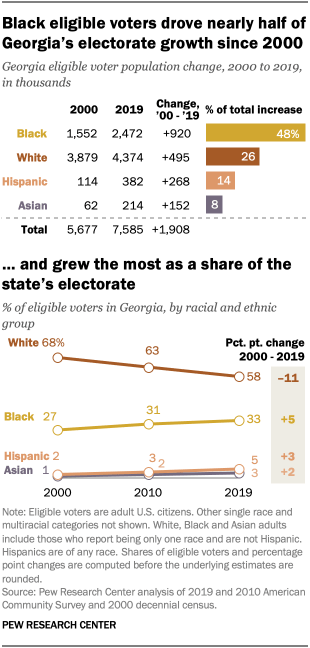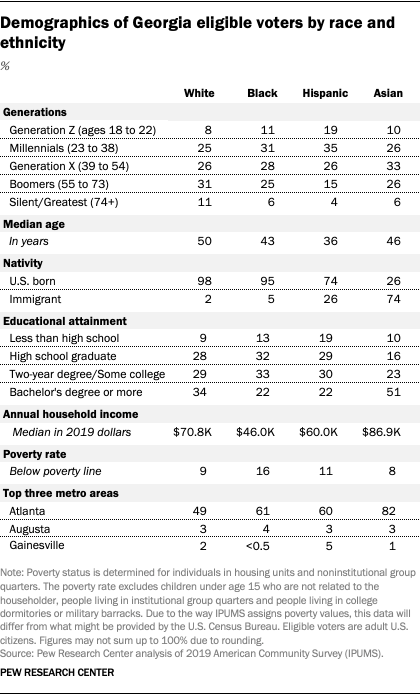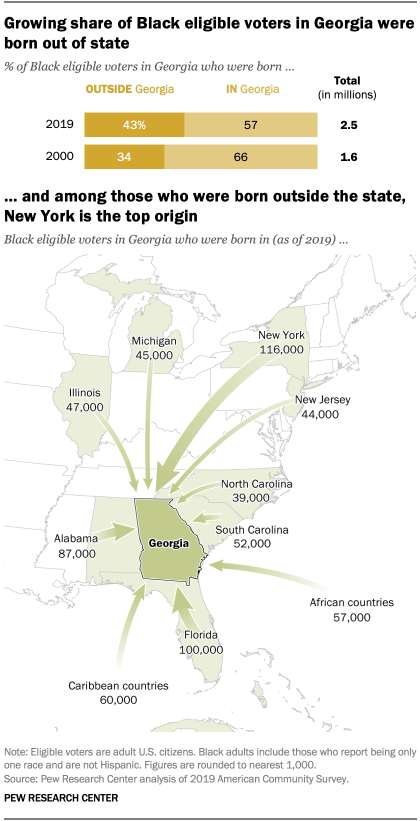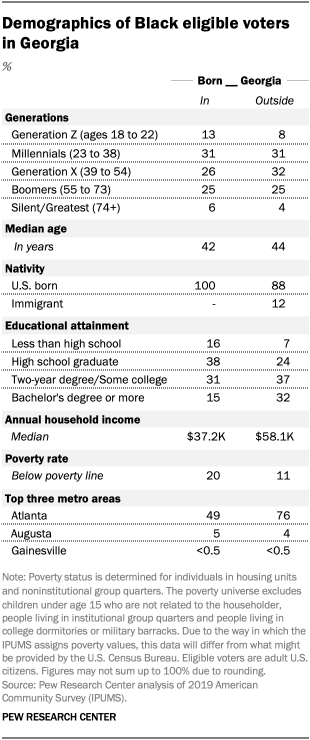Black eligible voters in Georgia have played a significant role in driving the growth of the state’s electorate over the past two decades. Between 2000 and 2019, Georgia’s eligible voter population grew by 1.9 million, with nearly half of this increase attributed to growth in the state’s Black voting population, according to a Pew Research Center analysis of new census data.
We undertook this demographic analysis of Georgia’s eligible voters at a time when the state is in the political spotlight because of Democrat Joe Biden’s victory there in the 2020 presidential election, and the state’s two upcoming U.S. Senate runoff elections that could determine party control of the chamber. (Eligible voters are defined as adult U.S. citizens.)
To do this, we drew on data from the Census Bureau’s 2019 American Community Survey as well as data from the 2000 decennial census provided through Integrated Public Use Microdata Series (IPUMS) from the University of Minnesota.
As an emerging battleground state in national elections, Georgia’s changing electoral makeup has been the focus of renewed attention in the 2020 election cycle. This is particularly true now given that the Jan. 5 runoff election for the state’s two U.S. Senate seats could determine which party controls that chamber.
Prominent public figures such as Democrat Stacey Abrams, a former lawmaker who lost a close race for governor in 2018, have highlighted Georgia’s racial and ethnic diversification as a major driver behind Joe Biden’s victory.
Biden won the state by a very narrow margin of just 0.2%, with about 12,000 votes more than Donald Trump. But it was the first time a Democratic presidential candidate had won the state in nearly three decades.
In 2019, the Black voting population in Georgia reached a record high of 2.5 million eligible voters, making up a third of the state’s total electorate. As a share of eligible voters in the state overall, Black voters saw a 5 percentage point increase between 2000 and 2019. This was the highest growth rate of any racial or ethnic group in Georgia – and also the largest percentage point increase among Black voters in any state in the country.
The Hispanic and Asian American voting populations in Georgia have also grown significantly, more than tripling in size between 2000 and 2019. However, these groups accounted for much smaller shares of the state’s electorate, 5% and 3%, respectively. The number of White voters in the state also grew during this time, but at a lower rate than other major racial and ethnic groups. As a result, the White share of Georgia’s eligible voters declined by 11 points, though the group still accounted for the majority (58%) of Georgia’s electorate in 2019.
Migration from outside Georgia a major source of growth for state’s Black electorate
The growth of Black eligible voters in Georgia has been largely driven by migration into the state from other parts of the country, as well as from outside the United States. Between 2000 and 2019, Black eligible voters who were born outside of Georgia accounted for a majority (58%) of the increase in the state’s Black voting population. (It is not possible to know from American Community Survey data when these individuals relocated to the state of Georgia. Eligible voters include both U.S.-born individuals and naturalized immigrants.)
In 2019, 43% of Black eligible voters in Georgia were born outside of the state (1.1 million out of 2.5 million), up from 34% in 2000 (532,000 out of 1.6 million). Over the same period, the number of Black voters who were born outside of Georgia doubled, while the number of Black voters born in the state increased by just 38%.
Georgia’s Black eligible voters born outside of the state have diverse origins. In 2019, among those born in the U.S., about 116,000 are from New York, more than double their number since 2000. They are followed by those born in Florida (100,000), Alabama (87,000), South Carolina (52,000) and Illinois (47,000).
These numbers have shifted in the past two decades. In 2000, those born in Alabama (66,000) and Florida (52,000) were the largest groups among Georgia’s Black eligible voters born outside of the state. New York (50,000), South Carolina (40,000) and North Carolina (24,000) rounded out the top five. Black eligible voters who were born outside the U.S. have also played a significant role in the growth of Georgia’s Black electorate. In 2019, about 123,000 Black eligible voters in the state were born outside of the country, with most tracing their origins to nations in the Caribbean (60,000) and Africa (57,000). Among those born in the Caribbean, the top countries of origin were Jamaica, Haiti, and Trinidad and Tobago, while Nigeria, Ghana and Ethiopia top the list among those who were born in Africa.
Meanwhile, naturalized citizens only make up 5% of Georgia’s overall Black electorate, but their numbers have grown more than fourfold over the past two decades, from 26,000 in 2000 to 123,000 in 2019. During this time, the country overall has also seen a substantial increase in its immigrant electorate.
Immigrant eligible voters in Georgia make up even larger shares of the Asian and Latino electorates than among the Black electorate. About three-in-four (74%) Asian eligible voters and one-in-four (26%) Latino eligible voters are naturalized citizens in the state.
Black eligible voters who were born outside Georgia have demographic characteristics that differ from those who were born in the state.
Those born outside the state had higher levels of education overall. In 2019, they were over twice as likely to have at least a bachelor’s degree or more education. Additionally, their median household income was 56% higher than that of the Georgia born ($58,100 vs. $38,200).
Poverty rates also differ between the groups. One-fifth of Black eligible voters (20%) who were born in the state of Georgia lived in poverty, a higher share than among those born outside the state (11%). In addition, Black eligible voters who were born outside the state were more likely to reside in the state’s largest urban areas. The Atlanta metro area is home to 76% of Black eligible voters who were born outside of the state, while just 49% of Georgia’s Black eligible voters born in the state resided in the metro.




